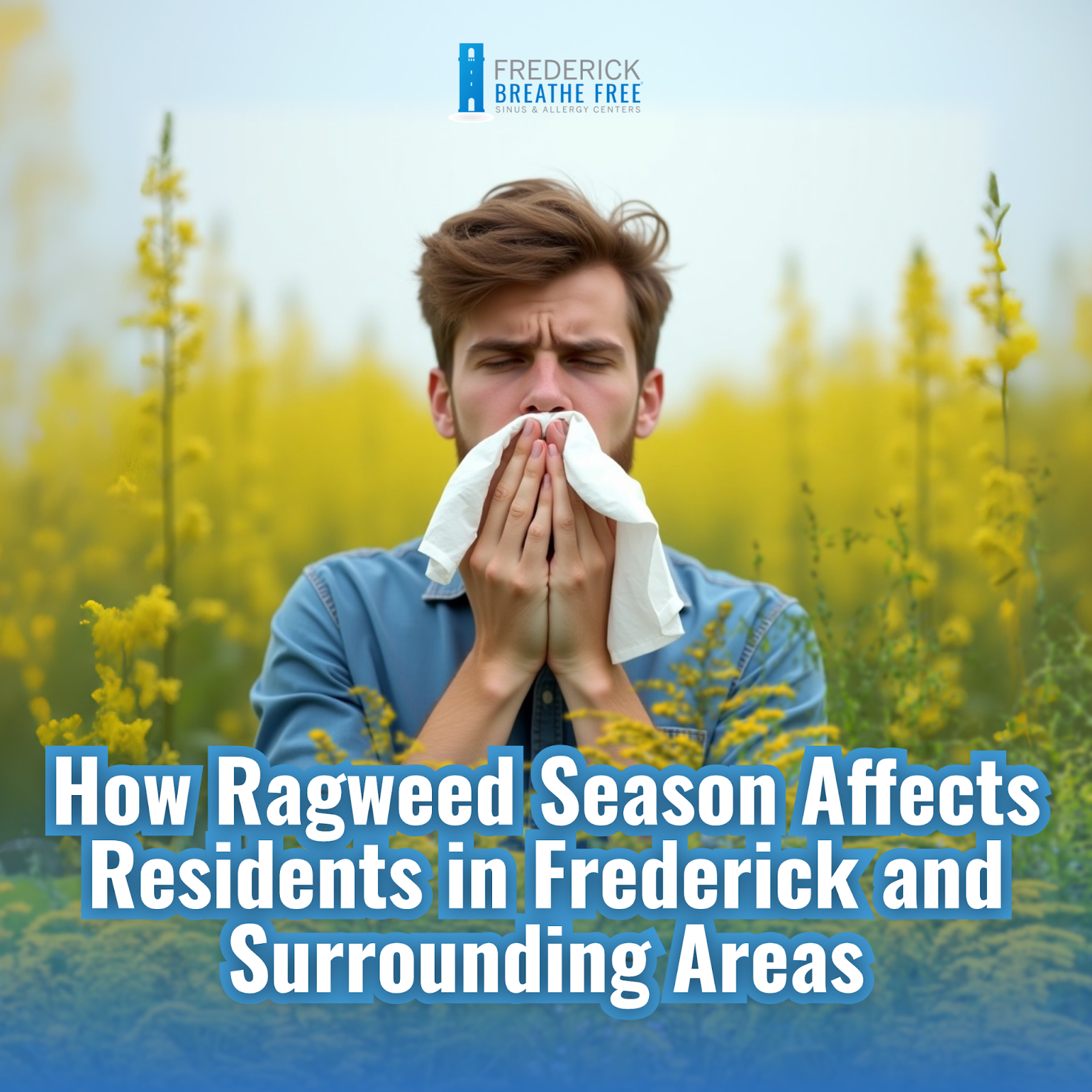How Ragweed Season Affects Residents in Frederick and Surrounding Areas
The city of Frederick, along with much of Maryland, follows a typical allergy season timeline. As summer turns into fall, millions of people across the U.S. begin to experience allergy symptoms — often triggered by ragweed pollen, one of the most common seasonal allergens.
Ragweed pollen season typically starts in August, peaks around mid-September, and can last until the end of October. During this time, Frederick residents may notice a spike in allergy-related symptoms, especially those who are sensitive to pollen.

What Is Ragweed?
Ragweed is a seasonal plant that grows throughout the United States. Though each plant only lives for one season, just one ragweed plant can produce up to 1 billion lightweight pollen grains. These grains travel easily through the air and can be inhaled through the nose or mouth, triggering allergic reactions in sensitive individuals.
What Is a Ragweed Allergy?
A ragweed allergy occurs when your immune system reacts to ragweed pollen as though it were a harmful substance. Inhaling ragweed pollen from the air can lead to a variety of allergy symptoms.
Common Symptoms of Ragweed Pollen Allergy
If you're allergic to ragweed, you may experience:
- Sneezing
- Runny or stuffy nose
- Itchy, watery eyes
- Postnasal drip
- Coughing or wheezing
- Itchy throat or nose
- Sinus pressure or fatigue
These symptoms often resemble those of the common cold but tend to last longer and recur annually during ragweed season.
How Is Ragweed Allergy Diagnosed and Treated?
If you suspect you’re allergic to ragweed, a consultation with a board-certified allergist in Frederick can provide clarity.
Diagnosis
Your allergist may perform:
- A skin prick test or blood test to confirm ragweed sensitivity
- A full physical exam and medical history review
Treatment Options
Once diagnosed, your Frederick ENT or allergist may recommend a personalized treatment plan including:
✅ Minimizing Exposure to Ragweed Pollen
- Check local pollen forecasts and adjust outdoor activities accordingly
- Keep windows and doors closed, especially on windy or high-pollen days
- Wear sunglasses, a hat, and a mask when outdoors
- Shower and change clothes after spending time outside
- Clean your pets and wipe them down before they re-enter your home
- Mow the lawn and trim weeds around your property
✅ Keeping Your Indoor Environment Clean
- Vacuum and dust regularly, especially during peak allergy season
- Use HEPA filters in your vacuum and air purifier
- Wash bedding and pillowcases in hot water weekly
- Maintain indoor humidity at 40–50% to prevent mold and dust mite growth
✅ Using Medications to Relieve Symptoms
- Begin allergy medications (such as antihistamines or decongestants) before the season starts
- Nasal corticosteroids can reduce sinus inflammation
- Saline nasal sprays can rinse out pollen and soothe irritated passages
- Speak with your provider about what combination is best for your needs
✅ Considering Immunotherapy
If over-the-counter or prescription medications don’t offer enough relief, immunotherapy may be an option. This long-term treatment — delivered via allergy shots or sublingual drops — may help reduce your body’s sensitivity to ragweed pollen over time. Talk to your allergist to see if you’re a candidate.
Frederick Breathe Free: Your Local Ragweed Allergy Specialists
If you’ve been searching for an ENT for ragweed allergies in Frederick, you’re in the right place. At Frederick Breathe Free, our team specializes in diagnosing and managing seasonal allergies, including ragweed pollen sensitivity.
We’ll help identify your triggers and develop a personalized care plan that may reduce your symptoms and support better breathing all season long. Whether you need testing, allergy treatment, or long-term prevention strategies, we’re here for you.


.png)
.png)



